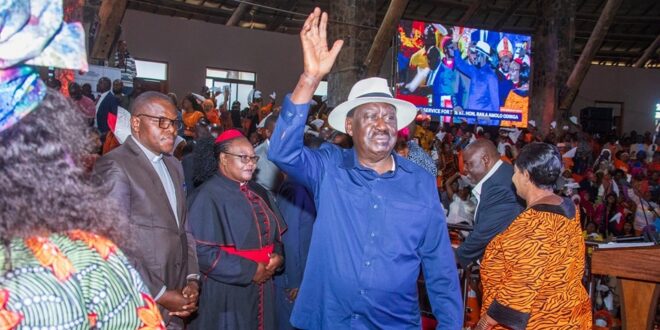Frankfurt-based Mickie Ojijo examines the political future of Kenya’s veteran opposition leader following his unexpected loss in the race for the Chairperson of the African Union Commission at the 38th Ordinary Session of the Assembly of Heads of State and Government last week.
Mr Raila Odinga’s ambition to lead the African Union Commission has officially come to an end, and the seasoned politician is now back in Kenya. Despite the veteran Kenyan’s prominence in African politics, Mahmoud Ali Youssouf, Djibouti’s long-serving Foreign Minister, secured the required two-thirds majority vote from the 49 eligible AU member states — with six countries under sanctions and thus ineligible to vote — to emerge as the new Chairperson on 15 February in Addis Ababa.
The public is now questioning whether Odinga still possesses his characteristic resilience to re-enter the complex political landscape of his home country or if he will finally retire from active politics.
Odinga’s February 2024 visit to Ugandan President Yoweri Museveni — widely regarded as a dictator — sparked speculation, particularly with claims that President Ruto’s simultaneous presence was merely coincidental. These suspicions were further fuelled by the involvement of former Nigerian President Olusegun Obasanjo in the early stages of Odinga’s candidacy.
Professor Peter Kagwanja recently told journalists that Odinga did not enter the race of his own volition but was pushed into it by his political benefactor, President William Ruto.
Despite an exorbitant campaign budget, Odinga’s team must have anticipated the significant challenges ahead before embarking on the campaign trail. Ruto’s authoritarian tendencies, including the resurgence of extrajudicial killings and abductions of youth and foreign dissidents in Kenya, were widely seen as damaging factors in such a high-stakes election. Odinga’s advanced age also emerged as a campaign concern.
His team deployed a public relations strategy to convince Kenyans that the warm receptions he received from heads of state during his campaign were a sign of an inevitable victory — a misleading assumption reminiscent of Kenyan electioneering tactics.
The nomination of former Madagascan Foreign Minister Richard Randriamadrato was seen as a strategic move. Dismissed by President Andry Rajoelina in 2022 for supporting a UN resolution condemning Russia’s invasion of Ukraine, Randriamadrato’s candidacy was a calculated ploy by the Southern African Development Community (SADC) to counter Ruto’s perceived dominance in African affairs. This strategy proved effective, costing Odinga ten crucial votes in the first round of voting.
Odinga also arrived in Addis Ababa burdened by his political baggage. His once-celebrated democratic credentials were called into question when he abruptly abandoned Kenya’s protesting youth (popularly referred to as Gen Z) in June 2024 to salvage Ruto’s embattled administration. The protests, which erupted in opposition to a punitive Finance Bill, government excesses, and rising youth unemployment, saw demonstrators storm the National Assembly, even taking the mace as a symbolic trophy.
The government’s response was brutal — security forces killed over 60 young protestors and arrested more than 300 others in a crackdown reminiscent of a Gestapo-style operation. President Ruto dismissed concerns, stating that such incidents would cease if parents disciplined their children. The African delegates in Addis Ababa were well aware of these developments.
There was a muted consensus within government circles that former Trade Minister Dr Mukhisa Kituyi would have been a far more suitable candidate. An astute administrator and politician, Dr Kituyi served as Under-Secretary-General of the United Nations Conference on Trade and Development (UNCTAD) for eight years in Geneva, where he built an extensive global network.
In contrast, the newly elected AU Commission Chairperson, Mahmoud Ali Youssouf, had served as Djibouti’s Foreign Minister for 20 years, whereas Odinga — a lifelong opposition figure — was seen as having been handpicked by Ruto for political expediency.
Speculation abounds that the AU bid, coupled with the appointment of five members of Odinga’s party to ministerial positions, was a calculated move by Ruto to (1) sideline Odinga from local politics and (2) ensure his political dependence on the President.
In the coming weeks, Odinga is likely to demand a government reconfiguration to secure a stronger political voice above the lieutenants he seconded to Ruto’s so-called broad-based government. Such a move could drastically alter the political landscape, presenting a scenario Ruto may not have foreseen.
As a result, speculation that Odinga’s voting bloc could support Ruto’s re-election in 2027 may soon dissipate, paving the way for Odinga to announce his own presidential candidacy once again.
 THE AFRICAN COURIER. Reporting Africa and its Diaspora! The African Courier is an international magazine published in Germany to report on Africa and the Diaspora African experience. The first issue of the bimonthly magazine appeared on the newsstands on 15 February 1998. The African Courier is a communication forum for European-African political, economic and cultural exchanges, and a voice for Africa in Europe.
THE AFRICAN COURIER. Reporting Africa and its Diaspora! The African Courier is an international magazine published in Germany to report on Africa and the Diaspora African experience. The first issue of the bimonthly magazine appeared on the newsstands on 15 February 1998. The African Courier is a communication forum for European-African political, economic and cultural exchanges, and a voice for Africa in Europe.






























